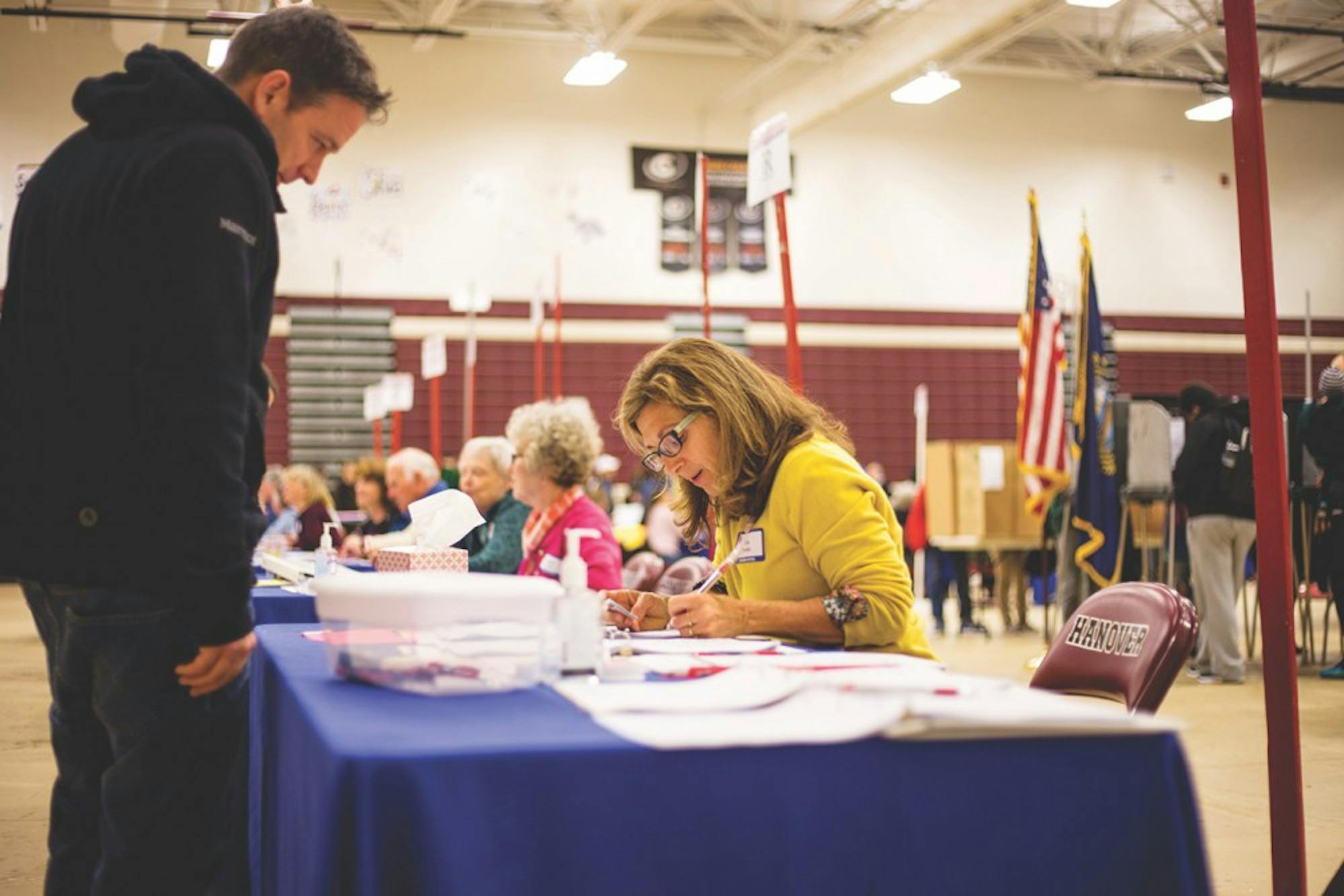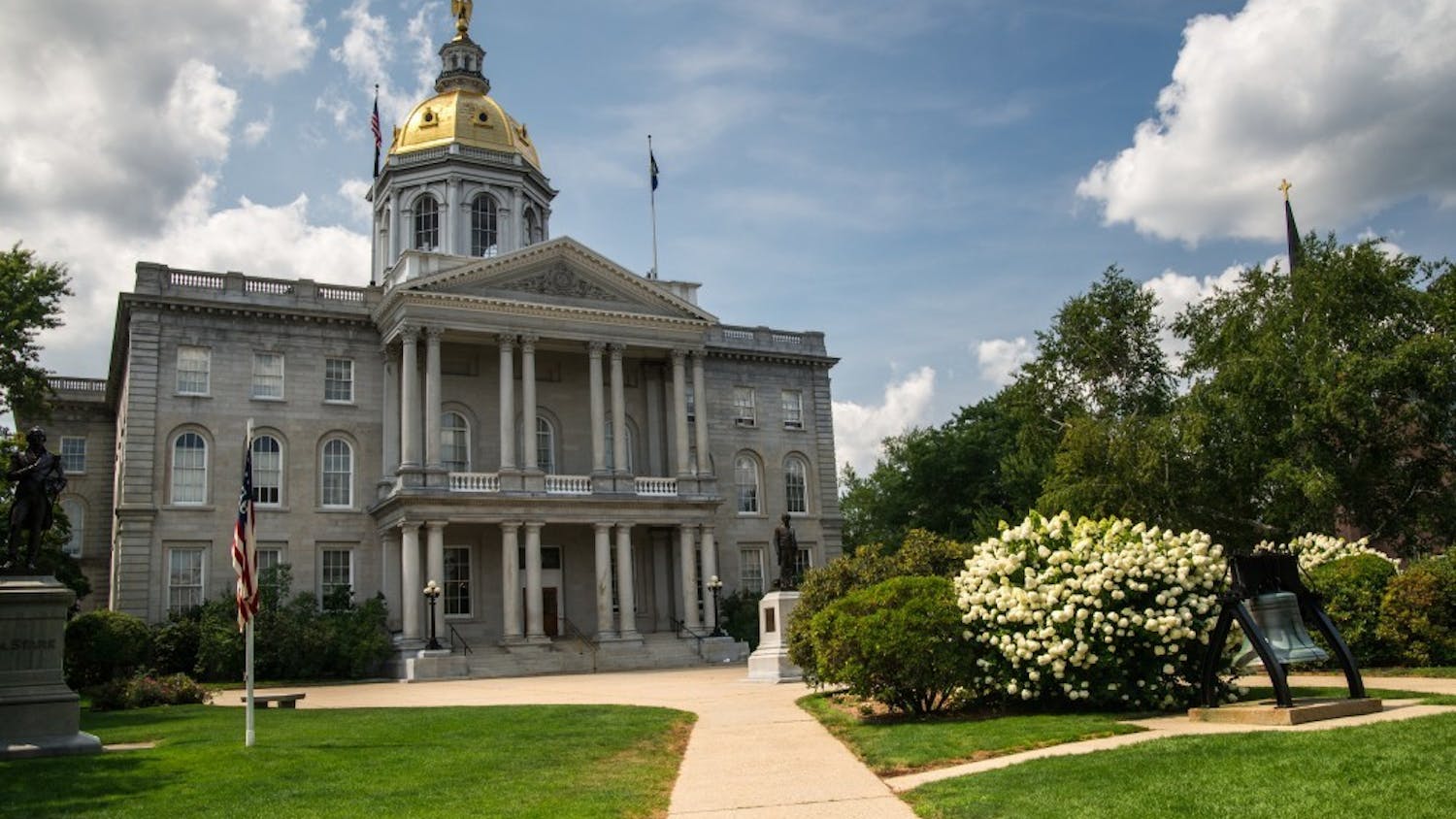Incoming freshmen may be bracing for their move to Hanover by investing in parkas and wool socks, low-cost Swedish furniture and new laptops. They may not expect, however, that moving to a swing state with a population of just 1.36 million people means they will also experience tight election races. In New Hampshire, elections have recently been, and may continue to be, decided by margins smaller than a Dartmouth class. Domestic students new to the state will have to make the decision of whether to vote absentee from home or partake in Hanover elections.
“When [students] arrive on campus and see how important voting is here, it really energizes a lot of people who didn’t ordinarily want to be involved in politics,” said Dartmouth Democrats member and former president Gigi Gunderson ’21.
According to Gunderson, in the 2018 election cycle, Dartmouth students were at the front lines of elections, rallying their classmates to register to vote and reminding them of the weight of their ballot. Gunderson dedicated an off-term to organizing on campus for New Hampshire’s coordinated democratic campaign.
Many political organizations, including the College Democrats and NextGen America, initiated major pushes encouraging students to vote in New Hampshire elections. The “Get Out the Vote” campaign in fall 2018 led to over 1,000 new Dartmouth voters in the midterm elections, Gunderson said.
However, this voting push has been promoted in large part by left-leaning groups on campus, due to the Republicans’ views on voting in New Hampshire versus a students’ home state.
“We’re unequivocally opposed to students voting in New Hampshire,” said College Republicans chief of staff Alexander Rauda ’21.
Upon arrival at Dartmouth, non-international students over the age of 18 must decide whether they would like to register to vote as a New Hampshire resident or as a resident of their home state.
For students like Rachel Florman ’21, a member of the Dartmouth Democrats, it was clear that voting in New Hampshire had a greater impact than voting in her home state of New York.
“I didn’t even think about switching my registration to New York City, which is where I’m from, because I’ve spent so much more time at school in the last two years than I have in New York,” Florman said. “I live here, I care about what happens here and I was excited to vote here.”
However, most Dartmouth students only live in New Hampshire for approximately 30 weeks each year. College Republicans treasurer Griffin Mackey said that, for this reason, he thinks it is wrong for students to make lasting political decisions for the state. He also noted that the lives of most Dartmouth students are centered around the campus, with little involvement in local communities.
Though Maddie Sach ’21 also hails from the state of New York, she said she chose to maintain her home-state registration due to the importance of local politics and the fact that she had volunteered for a state legislative candidate.
“I figured out that local politics can be much more important than politics on the national level,” Sach said. “So my thought process was that I’ll vote in local elections absentee, and then I was going to re-register in New Hampshire for 2020.”
Despite the state’s same-day voting policy, which allows voters to register within minutes at the polls on election, and the efforts of political groups to get students to register, recent policy changes may make it more difficult for students to vote.
New Hampshire House Bill 1264, which reconstructs the definitions of “resident” or “inhabitant” and “residence” or “residency,” went into effect in July but remains in litigation. The bill was passed in 2018 by then-Republican controlled legislature and signed by Governor Chris Sununu. Previously, voters only needed to demonstrate that they were domiciled in New Hampshire “more than any other place.” Now, however, HB 1264 requires those who wish to vote to present a New Hampshire driver’s license in order to prove residency For out-of-state students who wish to vote in New Hampshire, this new requirement means a trip to the DMV to purchase a driver’s license, whether or not the voter owns a car.
When Democrats won a majority in both houses in the 2018 midterm elections, they passed HB 105 and 106, with aimed to repeal New Hampshire Senate Bill 3 and HB 1264. SB 3, which preceded HB 1264 and was passed in 2017, requires New Hampshire voters to provide proof of domicile within 30 days of an election. Sununu vetoed the bills in July, following a New Hampshire Supreme Court ruling HB 1264 as constitutional. SB 3 was also let stand by the N.H. Supreme Court in 2017. Both chambers of the Democratic-controlled state legislature will likely meet in September to attempt to override the governor’s veto in September.
Proponents of HB 1264 argue that the policy simply puts New Hampshire on par with the voting laws in other states. District 21 NH Rep. Dick Hinch (R), has argued that HB 1264 will decrease the chance of voter fraud and improve the security of elections.
“Choosing New Hampshire as your domicile for voting should subject each and every one of us to the same obligation of state citizenship,” Hinch said. “This bill is about ensuring our elections remain fair for all who cast a vote in our state.”
Others are not convinced that HB 1264 will improve election security as much as it will complicate and “convolute” voting in New Hampshire. Hanover town clerk Betsy McClain, who is responsible for the administrative tasks that have to do with Hanover voting, has held her office for around nine years and said she has witnessed voting dynamics in the state change over the years.
According to McClain, policy changes such as HB 1264 not only create new impositions for voters, but also place new strains on voting officials. Elections rely on volunteers who donate four or five hours of their time to facilitate voting on election day. Those volunteers, however, may not necessarily monitor policy changes in voting regulations the same way a paid official would, McClain explained.
In addition to putting pressure on officials and volunteers on election day, HB 1264 stipulates that elected officials can’t advise voters on laws that apply to residents, McClain explained.
“As these laws become more convoluted, it puts us in a position where we can’t be as helpful as we feel our citizenry wants us to be,” McClain said.
Sach said that although she initially planned on switching her registration to New Hampshire before the 2020 elections, she decided that if HB 1264 goes into effect she would not go through with the process of getting a New Hampshire driver’s license in order to prove residency.
“I don’t have a car, so it makes no sense to get a New Hampshire’s drivers license and have to register that way,” Sach said.
Some frustrated Dartmouth students have decided to take action. The American Civil Liberties Union has filed Casey v. Gardner against the state of New Hampshire on behalf of lead plaintiffs Caroline Casey ’21 and Maggie Flaherty ’21, to challenge the legality of HB 1264. The plaintiffs allege that the restrictions that the bill places on voters hailing from another state are unconstitutional.
The plaintiffs assert that HB 1264 infringes on their right to vote by instituting a de-facto poll tax on voting and for targeting the voting rights of college students.
“People often complain about young adults not voting, but Dartmouth students want to vote,” Flaherty said. “A lot of students vote in New Hampshire and we want to engage with our community here. That desire is genuine. We want to make this our home; we want to make this our community for the next four years.”
McClain noted that the Office of Residential Life works with the Hanover town clerk’s office to help students obtain the paperwork they need to prove residency at Dartmouth.
Although the future of voting policy in New Hampshire is still being debated by state politicians, for students like Florman, registering to vote in New Hampshire best reflects their concerns and interests, giving them an opportunity to contribute to politics in the state.
“I pay taxes in New Hampshire, I study in New Hampshire, I live in New Hampshire,” Florman said. “It’s about democratic participation to begin with, because I care about what’s happening here, where I live.”
Gigi Grigorian contributed reporting.
This article is a part of the 2019 Freshman Issue.



